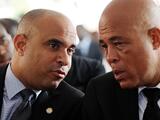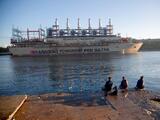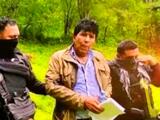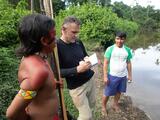Forty years after Somoza, Nicaragua fears return to dictatorship under Ortega

The arrests on fuzzy charges of subversion would appear to leave president, Daniel Ortega, and his wife, vice-president Rosario Murillo, running practically unopposed in November’s general elections.
"They are clearing the decks for November. It’s so vengeful and there’s no brakes on it,” said Jennie Lincoln, senior advisor to The Carter Center, headed by former U.S. president Jimmy Carter, who has observed several elections in Nicaragua.
Even so, the scale of the attack on Nicaragua’s opposition over the past week has surprised close observers of Ortega, who have watched him steadily eroded democratic rule in the country over his last 15 years in power.
“In the last 30 years, I've never seen anything like it,” wrote José Miguel Vivanco, the Americas director for Human Rights Watch.
Over the course of several days this week, the police jailed or put under house arrest, four opposition presidential candidates, including Cristiana Chamorro, the daughter of former president Violeta Chamorro, a prominent social activist, Felix Maradiaga, and a private sector business leader, José Adán Aguerri.
“He didn't have to do this. It’s like screw you to the whole world,” said Lincoln, noting that Ortega could possibly have won re-election against a divided opposition with all the built-in advantages he has amassed over the years, including control of the courts, Congress, a state media apparatus and other public resources.
To be sure, there is no rational explanation, said Carlos Fernando Chamorro, the country’s most prominent journalist and editor of the news website Confidencial, who is also the brother of Cristiana Chamorro.
Radicalization
"Under a premise of democratic rationality, it is impossible to understand why Ortega decided to give the coup de grace to the elections, but under the logic of authoritarian political radicalization, there are at least two interpretations," he wrote Thursday.
On theory is that "a competitive election, even without guarantees or international observation, represented a lethal threat to the survival of the regime," according to Chamorro.
"The second ... is that in order to stay in power without democracy or free elections, Ortega is taking the leap into the vacuum of radicalization, adopting the models of Cuba and Venezuela," he added.
President Ortega, who has been in power since 2007, is seeking his fourth consecutive election, (his fifth term in office) which would make him the newest dictator in the style of the Somoza family dynasty, which ruled for 42 years in the last century from 1936-1979.
Ironically, it was Ortega who led the popular ‘Sandinista’ revolution that toppled the last dictator, Anastasio Somoza in July 1979.
“He’s decided he’s going to fight to the end. He’s going back to his revolutionary zeal of the 1980s,” said Michael Shifter, el presidente del Diálogo Interamericano en Washington.

Election fears
Ortega appears to be taking another, less noble, lesson from his own past, the 1990 election which he lost to Violeta Chamorro, bringing an end to his first, decade-long Sandinista government.
“He made that mistake once and that was enough,” said Shifter, recalling that Ortega spent the next 16 years trying to get back into power. “He was out in the wilderness of 16 years and he’s sure as hell is not going to go back. So, he’s eliminating any potential challenge to his iron rule. It’s as simple as that,” he added.
Ortega is also no doubt haunted by the last election in 2016 which was marred by numerous irregularities, including the choice of his wife as his vice-presidential running mate. Massive street protests erupted a year later after Ortega announced a surprise social security system reform that raised taxes and reduced benefits.
Relacionados
The rebellion of the Sandinista's grandchildren
Protests
Outrage over repressive police tactics transformed the protests into a nationwide movement calling on Ortega to resign. More than 120 people killed in street protests, mostly by gunfire from police and progovernment paramilitaries. About 130 political prisoners remain in jail, human rights groups say.
As a result the Ortega government has found itself ostracized by most of the democratic world, sanctioned by both the United States and the European Union. Domestically, the country also faces a three-year-long economic recession made worse by the pandemic.
"The regime has got its wires crossed. It's desperate," Berta Valle, the wife of Maradiaga, one of those arrested on Tuesday, told Univision. "This is a sign that they are really weak and the only thing they can do is this kind of thing and close clamp down," she added.
Shifter and others say Ortega may be influenced by the manner in which his socialist ally, Nicolas Maduro in Venezuela, has managed to resist international pressures, including U.S. sanctions.
More sanctions
The move against his opponents is also a slap in the face to the new government of Joe Biden in Washington, and especially the visit earlier this week to Central America by vice president Kamala Harris.
The U.S. responded to the crackdown this week by sanctioning four more of Ortega’s officials, including one of his daughters, Camila Ortega, the head of Canal 13, a state TV station.
But, analysts note that sanctions against dozens of other top Nicaraguan officials have failed to undermine Ortega’s grip on power. “The sanctions are pretty weak in light of the gravity of the situation,” said Shifter. “I think he sees there’s no cost at this point,” he added.
Ortega has escaped most of the attention in Washington which is focused on the migrant situation in Northern Triangle countries of Guatemala, El Salvador and Honduras. Nicaragua makes up a relatively small number of migrants from the region at the southern border, though many others have fled south to Costa Rica.
“The U.S. is distracted. There’s very narrow interest because they are worried about the border pressures and the political problems that creates,” said Shifter.
Moves are afoot at the Organization of American States (OAS) to perhaps invoke the organization’s Democratic Charter, effectively expelling Nicaragua for violating its terms of membership. However, that in the past has not dissuaded Venezuela or Cuba.
Gag Law
Meanwhile, Ortega’s opponents are seeking to rally support but it remains to be seen how much stomach Nicaraguans have for another round of street clashes.
"Despite everything that may come our way, the regime is the real minority, in the face of a nation that wants work, a nation that wants peace, and wants freedom," Maradiaga told reporters on Tuesday before he was hauled off to jail.
But resistance to Ortega may be even more difficult now after the passage of new laws designed to silence dissent. Most of the latest political detainees have been held under a new 'Gag Law' passed in December that prohibits so-called "traitors to the homeland" from running for public office.
"The law uses extremely vague terms in defining 'traitors' for example, as those who 'undermine independence, sovereignty, and self-determination' or 'injure the supreme interests of the nation.' The law does not indicate how such a determination would be made, nor who would make it," according to Human Rights Watch.
For example, the arrest warrant against opposition member Mario Arana, former president of the Central Bank of Nicaragua, refers to an alleged crime "that compromises the peace or dignity of the Republic."
In the case of Chamorro, prosecutors appear to be seeking to apply the new law to U.S. government funding of a journalism foundation she founded, named after her mother. Since 2015, the foundation has received about $1 million dollars annual funding from the U.S. Agency for International Development (AID) as part of a ‘ Media Strengthening Program.’
Ortega, and his wife, have frequently railed against the U.S. funding, and it is now illegal under the December law. That may explain why, as part of this week’s crackdown, prosecutors questioned nearly 30 journalists, including two affiliated with Univision, in what prosecutors said was an investigation of undetermined ‘cyber crimes.’
Last month, the National Assembly approved an electoral reform that consolidates the government’s control over the electoral process, and also appointed the new members of the Consejo Supremo Electoral, (CSE), naming only members who had been nominated by the ruling Sandinista party (FSLN).
"Under these circumstances, it is impossible for Nicaraguans to exercise their political rights in free and fair elections," said Vivanco, of Human Rights Watch.
A lot will depend on the response of Catholic Church and local business leaders, the traditional power brokers in Nicaragua, says Carlos Fernando Chamorro, who could easily be the next person put behind bars.
"The dilemma is to set the limits now, to shorten the country's suffering in human losses, the curtailment of freedoms, and the economic and social costs of the crisis, or to wait for the system to collapse under its own weight, at the cost of greater sacrifices for all," he wrote.



